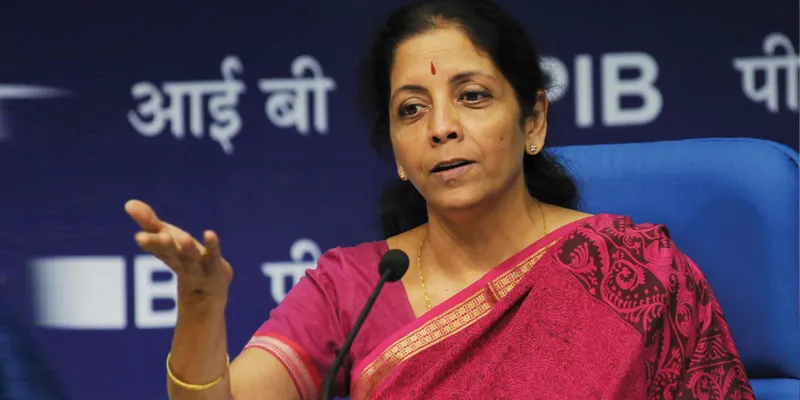Foundation for $5T economy laid in Budget 2020: FM Nirmala Sitharaman
Finance minister Nirmala Sitharaman says majority of government investment is directed towards creating infrastructure, and focusing on health and agriculture to 'create the foundation for the $5 trillion economy'.
Finance Minister Nirmala Sitharaman on Sunday said the foundation for achieving the goal of $5 trillion economy by 2024-25 has been laid in the Union Budget, which stressed on increasing capital expenditure for infrastructure.
She said that the Budget also focused on increasing consumption and investments towards building assets.
"I think we have laid the foundation for increasing consumption and investments towards building assets such as infrastructure, which should have a cascading effect in the long and short term," Sitharaman said.

Union Finance Minister Nirmala Sitharaman
She said this would trigger the virtuous cycle for the economy to perform and move forward.
"The majority of government investment is directed towards creating infrastructure and through various windows like health and agriculture to avoid any kind of rural distress. These will create the foundation for the $5 trillion economy," she said.
Asked about the rationalisation of rates of Goods and Services Tax, the finance minister said it was being reviewed every three months by the GST Council.
"If the rates are reviewed every three months, the government cannot make an assessment of revenue collection. Can we consider a situation where rate rationalisation is done once a year and not every three months? I have proposed the GST Council to consider it," she said.
Rationalisation of GST rates once a year would help the government and businesses, she said.
"It is not that GST collection is not happening. The indirect tax administration is now getting the benefits of data analytics to prevent fraudulent activities," the finance minister said.
GST collection has been around Rs one lakh crore per month, she added.
To a query whether GST has been revenue-neutral as was envisaged, the finance minister said, "The compensation rate (for states' revenue loss) was fixed at 14 percent on the basis of certain level of calculation. However, collections have fallen (short of expectations) and so there will be an impact."
The compensation rate was fixed on the premise that the economy would grow by 12-13 per cent, she said,
"But in the last two months, the economy grew less than that. However, the government will pay compensation (to the states) within a time line", Sitharaman said.
To a question about bringing petrol and diesel under GST, she said a lot of discussion had taken place when the new law was framed.
"My predecessor, the late Arun Jaitley, made a provision for making petroleum products zero-rated. When states are ready, there is no need for any amendment to bring petroleum products under GST and the Council can do that," the finance minister said.
Closely monitoring lending
On liquidity to industry and NBFCs, she said every possible step was being taken to ensure that availability of cash does not become an issue.
"The government is closely monitoring lending by both public and private sector banks. Secretaries are continuously engaged with the banks, and every possible step is being taken so that liquidity is available," she said.
Sitharaman also dismissed the fear that the optional direct tax structure, as announced in the budget, would decrease savings and thereby investments.
Regarding partial disinvestment in LIC through an IPO, as announced in the Budget, she said, "Indian people will hold shares and there is no reason to believe as to why money in the insurance company will not be secure after the shares will be offered to the public."
Sitharaman said, "I do not know what will be the extent of disinvestment. May be eight, 10, or 12 percent. The government will have the remaining shareholding."
(Edited by Teja Lele Desai)









